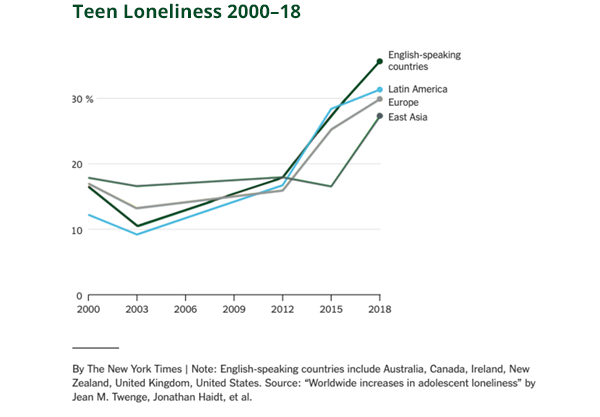Why Relationships?
Our mission is to empower America’s youth to build positive relationships and become their best selves.
Why relationships? Because they are the cornerstone of health, happiness, resilience…and (according to experts) many jobs of the future. That is why we developed a strategy that schools use to inspire positive relationships (student-to-student and student-to-teacher) and cultivate school-wide #PositivityInAction.
The Problem
The research is clear. Our ability to build positive relationships is under assault.
Narcissism and Empathy
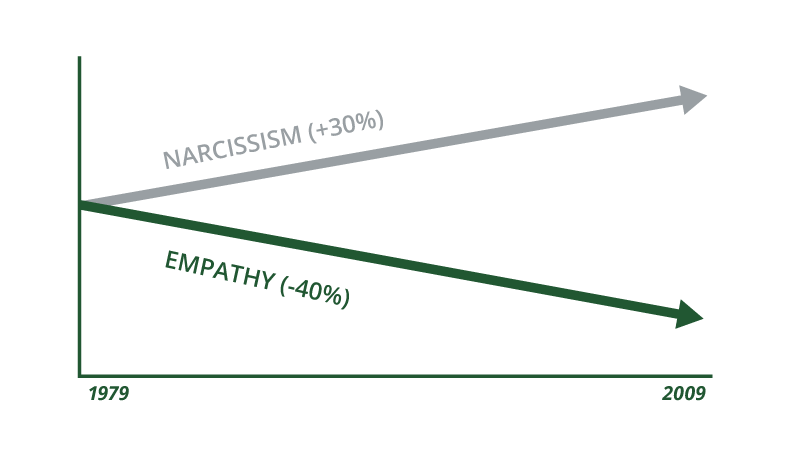
Teen Loneliness, Smartphones, and Social Media
In 2021, Dr. Jean Twenge and Dr. Jonathan Haidt presented research showing that loneliness among 15-year-olds sharply increased worldwide beginning in 2012. They attribute this increase to the rise of social media, explaining, “2012 was the first year that a majority of Americans owned a smartphone; by 2015, two-thirds of teens did too. This was also the period when social media use moved from optional to ubiquitous among adolescents.”
 Loneliness in America
Loneliness in America
U.S. Surgeon General Dr. Vivek Murthy declared loneliness a public health crisis — with profound consequences for our mental and physical well-being. In his groundbreaking 2023 Advisory on Our Epidemic of Loneliness and Isolation, Dr. Murthy wrote, “Our epidemic of loneliness and isolation has been an underappreciated public health crisis that has harmed individual and societal health. Our relationships are a source of healing and well-being hiding in plain sight – one that can help us live healthier, more fulfilled, and more productive lives.”
Why are relationships so important?
Positive relationships are the cornerstone of health, happiness, resilience…and jobs of the future.
Health and Happiness
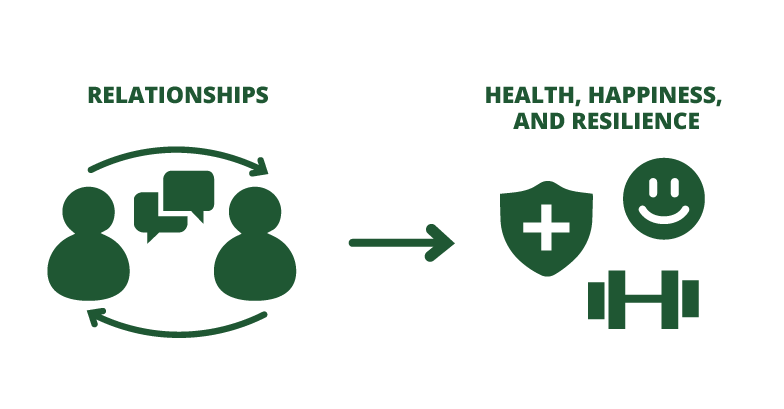
Harvard University Study on Adult Development
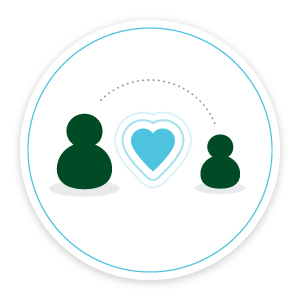 Resilience
Resilience
Jobs
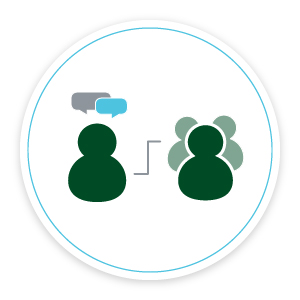
Persuasion, Negotiation, and Group Dynamics

Framing and Solving Open-ended Problems
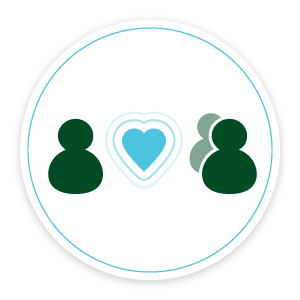
Human Interaction and Nurturing
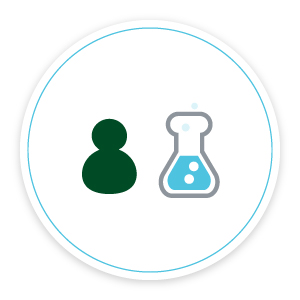
Applied Math and Statistics
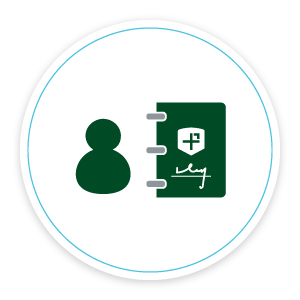
Sound Writing
Our Model
Grounded in character strengths research.
Consistently focusing on all 24 character strengths helps students — and adults — develop self-awareness and empathy. This leads to positive relationships and a more positive school culture — that enhances teachers’ ability to teach and students’ ability to learn important subjects like math, science, social studies, and English.
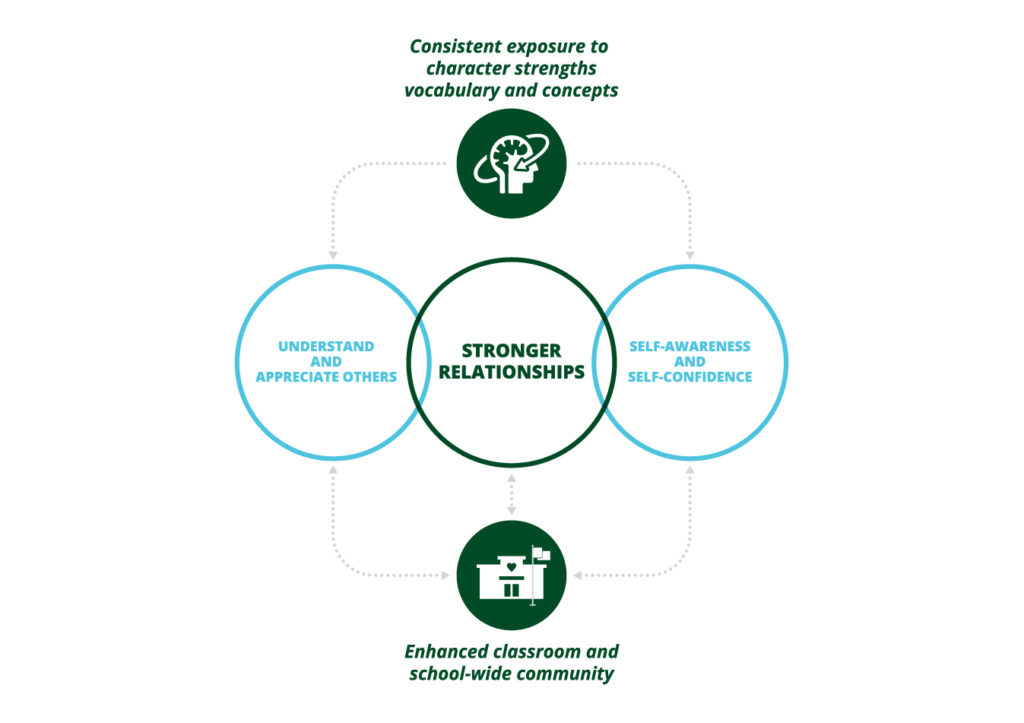
The Evidence
Supported by strong empirical evidence.
The Positivity Project meets the criteria for a Tier 2 evidence-based intervention under ESSA.
A paper published in the International Journal of Education about P2 Partner Schools at the elementary and middle school level show that students reported significantly greater feelings of having quality relationships with others. When asked to name their favorite part of P2, the most frequent response from students was, “It makes me feel understood.” Read the summary here. Read the full paper here.
The peer-reviewed journal article “Change in Teacher-Student Relationship Quality During a Tier-One Character Education Intervention” explains that “The quality of relationships between students and teachers is strongly associated with students’ academic, social, and behavioral success.” The paper then shows that students and teachers “experienced higher rates of closeness and lower rates of conflict” as a result of The Positivity Project, compared to a control group that didn’t use The Positivity Project.
“Character Education to Address Elementary Students’ Emotional and Behavioral Development: A Quasi-Experimental Study” is an academic journal article that investigates “students’ exposure to the P2 curriculum and changes in their teacher-reported emotional and behavioral problems.” The research then highlights, “students exposed to the P2 curriculum experienced significantly greater reductions in both teacher-reported internalizing and externalizing behavior problems, as compared to students in control classrooms. Furthermore, teachers reported a relatively high level of fidelity of implementation. This finding is important because research suggest only about 50% of teachers implement SEL interventions with adequate levels of fidelity (Low et al., 2016).”
A paper published in the International Journal of Emerging Trends in Social Sciences highlights P2’s impact in elementary, middle, and high schools. As one educator explained, “I can honestly say I have never felt so good about a character education program in my teaching career. I can actually see this program working every day. Each week that we touch on new strengths, we are all reminded of our potential to be better human beings. We have truly seen a transformation in our program since we began using The Positivity Project…We have watched kids transform again and again, from disrespectful to respectful, from challenging to cooperative, and from ungrateful to grateful, just by modeling appropriate behavior, sharing learning experiences, and using character strengths to build relationships.”



